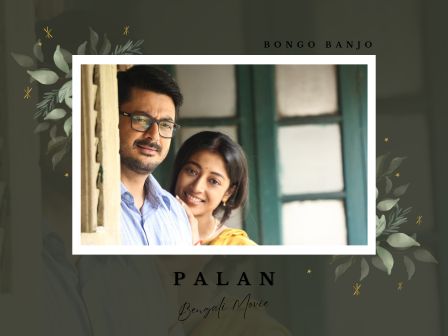Palan Bengali Movie Review!
Explore the cinematic masterpiece 'Palan,' a heartfelt tribute to director Mrinal Sen, as we delve into its storyline, characters, and the directorial brilliance of Kaushik Ganguly.
Introduction
In the world of cinema, some films transcend time and memory, capturing the essence of the past while reflecting the present.'Palan,' released this Friday, is one such cinematic gem that holds a special place in the heart of director Kaushik Ganguly.
Join us as we embark on a journey through this heartfelt tribute to the late filmmaker Mrinal Sen on his centenary.
Unveiling the Story
"Palan" takes us on a poignant journey where time circles back to revisit the past, rekindling memories that were thought to be long forgotten.Anjan Sen, played brilliantly by Anjan Dutt, finds himself reunited with his distant past, a staggering four decades later.
Alongside Anjan, long-buried memories resurface, including a tragic incident that occurred twelve years ago within the confines of a house named 'Palan.'
Today, the very same house faces a 'controversial' declaration by the municipal council, receiving a three-day eviction notice.
Today, the very same house faces a 'controversial' declaration by the municipal council, receiving a three-day eviction notice.
Despite their struggle to retain the property, the occupants engage in a battle not only for their home but also to find a piece of soil to plant trees.
A Tribute to Mrinal Sen
Director Kaushik Ganguly masterfully crafts 'Palan' as a tribute to the legendary director Mrinal Sen.Drawing inspiration from Mrinal Sen's earlier film 'Kharij,' Kaushik Ganguly retains the core characters while introducing new ones. Time, however, plays a pivotal role in this narrative.
Anjan Sen and Momota, portrayed by Momota Shankar, continue to reside in the Belatala house, but now their son Pupai, played by Jisshu Sengupta, is married to Pauli, portrayed by Pauli Dam, and they live in a nearby apartment.
A Battle for the Future
The film grapples with a crucial question: What lies ahead for the parents, Anjan and Momota?Will their descendants inherit 'Palan,' or will it succumb to becoming just another rented property?
These questions form the crux of the story, offering a thought-provoking exploration of issues that resonate with many in the bustling city of Kolkata.
A Blend of Past and Present
Kaushik Ganguly seamlessly weaves the past and present into his narrative, leaving no room for criticism.He handles the story with utmost care, making 'Palan' accessible to both those who have seen 'Kharij' and those who haven't.
Stellar Performances
Anjan Dutt's portrayal of Anjan Sen is the linchpin of this story. He delivers a remarkable performance, whether as the stern father, the rebellious figure, the system-opposer, or the vulnerable man beneath the façade.Momota Shankar complements him beautifully, adding depth to the characters. Hari, played by Debapratim Dasgupta, and Srila, portrayed by Srila Majumdar, make impactful appearances in the narrative.
Buddhabdev Bhattacharya briefly steps into the role of the promoter, seamlessly blending with the original story.
The new characters of Anjan's son and daughter-in-law feel like natural extensions of the storyline.
Cinematic Brilliance
Appu Prabhakar's camera work establishes the old house as another significant character in the film.'Palan' places a strong emphasis on various sounds, from the bustling street commotion to the echoing crashes within the house.
Accompanied by Nil Datta's evocative background music, these elements leave a lasting impact on the viewer.
Unfulfilled Curiosity
One minor drawback is the desire to learn more about Pauli's character, which remains somewhat unfulfilled.Conclusion
'Palan' is more than just a movie; it's a deeply personal journey for Kaushik Ganguly.For those who appreciate the work of Mrinal Sen and are familiar with the locations, 'Palan' is an invaluable gift that beautifully captures the essence of time and memory.
No, 'Palan' is not a sequel to 'Kharij.' While it retains some core characters and themes, it stands as an independent narrative, accessible to both those familiar with 'Kharij' and those who are not.
Q2: What is the significance of the house 'Palan' in the film?
The house 'Palan' holds great significance in the film, serving as a central element in the narrative. It represents not only a physical space but also a repository of memories and emotions, making it a character in its own right.
Q3: How does 'Palan' pay tribute to director Mrinal Sen?
'Palan' pays tribute to director Mrinal Sen by drawing inspiration from his earlier work, 'Kharij.' The film retains the core characters while introducing new ones and exploring the passage of time, echoing Sen's cinematic style and themes.
Q4: Is 'Palan' a reflection of contemporary issues in Kolkata?
Yes, 'Palan' addresses contemporary issues in the bustling city of Kolkata, particularly the challenges of urban development and upheaval. It weaves these issues into the storyline, resonating with the experiences of many in the city.
Q5: How does the film explore the theme of time?
'Palan' explores the theme of time by juxtaposing the past and present. It revisits long-forgotten memories, allowing characters to confront their history and grapple with the changes that time has brought to their lives.
Read More: Asukhwala Bengali Movie Review!
FAQs
Q1: Is 'Palan' a sequel to 'Kharij'?No, 'Palan' is not a sequel to 'Kharij.' While it retains some core characters and themes, it stands as an independent narrative, accessible to both those familiar with 'Kharij' and those who are not.
Q2: What is the significance of the house 'Palan' in the film?
The house 'Palan' holds great significance in the film, serving as a central element in the narrative. It represents not only a physical space but also a repository of memories and emotions, making it a character in its own right.
Q3: How does 'Palan' pay tribute to director Mrinal Sen?
'Palan' pays tribute to director Mrinal Sen by drawing inspiration from his earlier work, 'Kharij.' The film retains the core characters while introducing new ones and exploring the passage of time, echoing Sen's cinematic style and themes.
Q4: Is 'Palan' a reflection of contemporary issues in Kolkata?
Yes, 'Palan' addresses contemporary issues in the bustling city of Kolkata, particularly the challenges of urban development and upheaval. It weaves these issues into the storyline, resonating with the experiences of many in the city.
Q5: How does the film explore the theme of time?
'Palan' explores the theme of time by juxtaposing the past and present. It revisits long-forgotten memories, allowing characters to confront their history and grapple with the changes that time has brought to their lives.
Read More: Asukhwala Bengali Movie Review!














%20Biography,%20Age,%20Career,%20Wife,%20Networth.jpg)